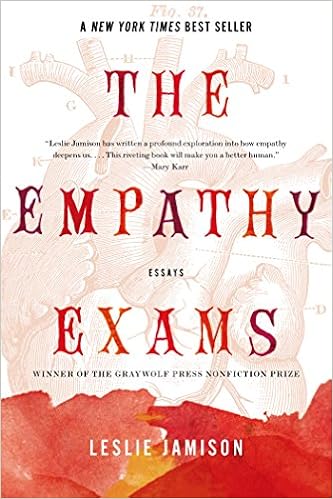The Empathy Exams: Essays, by Leslie Jamison

The Empathy Exams is a hybrid work of memoir, literary, cultural, and moral investigation, distilled in essays that are rich, astute, and candid. This is Jamison’s second book (following a 2011 novel The Gin Closet), ad winner of the Graywolf Press Nonfiction Prize that went on to the New York Times bestseller list. In these essays that are as much journalistic as personal, Jamison writes of her part-time job as a medical actor—playing a patient for medical residents (in the title essay)—an exploration of the nature of empathy. Another essay, “The Devil’s Bait,” is an uncomfortable look at the author’s battle with Morgellons disease, a chronic itching condition, as well as the medical establishment’s treatment of patients whose illnesses can’t be measured or proved by medical evidence. In a “Grand Unified Theory of Female Pain,” Jamison interrogates female woundedness and its tropes in literature—in Dickens’ Miss Havisham, Tolstoy’s Anna Karenina, and Tennessee Williams’ Blanche Dubois, for example—portrayals that rely on sadness, illness, frailty, and troubling metaphors:
“The old Greek Menander once said, ‘Woman is a pain that never goes away.’ He probably just meant women were trouble. But his words work sideways to summon the possibility that being a woman requires being in pain; that pain is the unending glue and prerequisite of female unconsciousness.”
Jamison’s prose is searing and smart and she has the authority that comes from a breadth of reading, incorporating a range of authors, from James Agee and Susan Sontag to Lucy Grealy and Anne Carson. These extraordinary essays document the author’s personal experience with pain—emotional and physical (as the result of a heart condition), but she has a larger aim, to mine what it is, and what it means, to feel empathy—for others to understand her pain and her ability to understand the pain of others—all of which Jamison portrays with crisp sentences, keen perception, and scholarly care.
—Lauren Alwan



